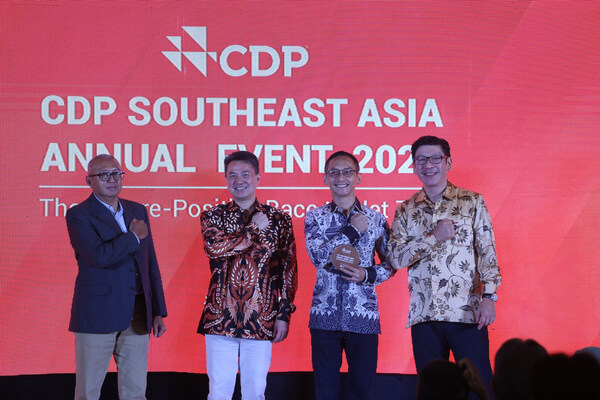- 2022 saw 493 companies across the Southeast Asia region disclosed their environmental data to CDP, growing 47% compared to the previous year.
- From total disclosures, a total of 482 companies disclosed their emissions, targets and climate action through CDP's Climate questionnaires.
- However, disclosure through forests and water security questionnaires are lagging behind, with just 123 companies disclosing on water and 35 companies on forests, and 20 companies (or 4%) disclosing across all three themes.
- Companies in Southeast Asia are still short of ambition in making environmental commitments with only 4% of companies having a Science-based target in climate and about 5% of companies having a water pollution reduction target;
- Only 5 Southeast Asian companies made it to CDP's A list in 2022, compared to 330+ companies globally. 4 of the 5 companies are headquartered in Thailand and one in Singapore.
SINGAPORE, March 20, 2023 /PRNewswire/ -- There is a growing momentum of environmental disclosure and action in Southeast Asia, with a 47% increase in disclosures through DP across the region, according to a new report by CDP, the world's environmental disclosure platform.

Donald Chan, Managing Director CDP Asia Pacific, alongside John Leung, CDP's Director of Southeast Asia & Oceania, showed appreciation to Indonesian Chamber of Commerce and Industry (KADIN) during the CDP Southeast Asia Annual Event 2023 that was held in Jakarta (16/3). During the event, CDP revealed their latest report, Nature Incorporated, which highlighted a growing momentum of environmental disclosure and action in Southeast Asia, published with support from global climate solutions provider South Pole.
The new report, Nature Incorporated, published with support from global climate solutions provider South Pole, finds that while the region's companies showed increased commitment towards transparent environmental action in 2022, the number of companies disclosing, and taking action, on forests and water is still far from the critical mass required to contribute significantly to the world achieving global environmental targets. In 2022, 482 companies across Southeast Asia reported climate data through DP, but only 123 disclosed on water and 35 for forests. CDP also reported that only 20 (or 4%) companies in Southeast Asia made disclosures across the three themes of climate change, forests, and water security.
There is room for greater ambition, focus and commitment to be shown by the region that we live in. Being not only culturally diverse, Southeast Asia is also extremely biodiverse. The region houses spectacular biodiversity hotspots and natural ecosystems including precious marine ecosystems comprising 30% of the world's coral reefs, one-third of the world's mangroves[1], and nearly 15% of the world's tropical forests[2].
The report highlights that Southeast Asian companies understand the urgency of the situation, estimating the financial impacts of risks across climate change, forests, and water security to far exceed the cost of responding to these risks. Yet only 5 companies made it to CDP's A lists in 2022, compared to 330+ companies globally. Four of the five companies were on the Climate Change A list, and three companies were on the Water Security A List.
The environmental impacts of the supply chain also remain significantly underestimated by Southeast Asian companies. Supply chain engagement is still regarded only as a "good-to-have" instead of a "need-to-have" in Southeast Asia. Only 31% of disclosers engaged suppliers on climate-related issues.
[1] Loke, M. C. (2014). Sustainable Development of Southeast Asia's Marine Ecosystems – Climate Change Challenges and Management Approaches. Chou2014Int._Conf._ Mar._Sci._Aquac.pdf (nus.edu.sg) [2] Estoque. R., et al. (2019). The future of Southeast Asia's forests. The future of Southeast Asia's forests | Nature Communications |
The world is severely lagging the necessary action to achieve net zero and adequately protect the natural environment and resources – collective action is necessary from governments, investors, corporations, and people for us to be able to avert the worst impacts of climate change. CDP's data shows that deforestation and water insecurity pose real material risks to businesses that are being underestimated and overlooked – there will be great costs for the region if there is local and global inaction.
John Leung, Director, Southeast Asia & Oceania, CDP said:
"In this annual event, we reveal the latest analysis and findings of CDP's environmental data while recognizing the region's corporate environmental leaders, as well as those organizations in Indonesia that have showcased leadership in achieving our common goal to align with the Paris agreement and are at the core of the movement towards a nature-positive, net zero future.
"Climate change impacts are accelerating across the globe and could quickly become irreversible. But, even today, a 1.5°C-aligned, net-zero, nature-positive world is possible, but we need to act now and tackle the converging crisis. Southeast Asia, being the home of some of the fastest economic growth in the world, and especially due to its richness in biodiversity, will play a pivotal role in the future of our planet.
"So, while we are deeply encouraged by the growth of disclosure in Southeast Asia – which is the first essential step for effective corporate environmental action – we urge all to do more, and show greater ambition and leadership, for the region and the world. We look forward to seeing business and policy leaders continue to lead the way towards a greener, sustainable, more resilient future, as more and more corporates in Southeast Asia disclose and demonstrate their environmental management and climate ambition, in the transition to a net-zero, nature positive and equitable world, where harmony is restored between people and planet."
Shruti Singh, Regional Director, Climate Strategies, South Pole said:
"Businesses in Southeast Asia truly sit on the frontline of climate change. This report clearly shows that the cost of mitigating this risk is much lower than the cost of doing nothing, and still, many companies are held back from taking real climate action because it seems overwhelmingly complex and costly. The reality is that no company has the perfect plan or all the answers today, but this must not prevent them from progressing on their sustainability journey. Everyone reading this report, from CEOs and CFOs to sustainability officers and supply chain managers, should be inspired by the efforts of Southeast Asia's leading companies — especially those that are disclosing across climate, forests and water — and motivated to bring the same momentum to their own organisations."
The Nature Incorporated report and its findings were revealed on 16 March 2023, during the CDP Southeast Asia Annual Event 2023, hosted in Jakarta, Indonesia, which is among the first and longest disclosing city in the region. Chosen to host the event due to its importance role in the region, economically and biodiversity-wise, which marks its importance to ever achieving a nature positive net zero future.
During the event, CDP also recognized five Southeast Asian companies as A-list for their environmental transparency and action, including Thailand based companies CP ALL Pcl, Kasikornbank, Siam Cement and PTT Global Chemical, as well as Singaporean based City Developments Limited.
CDP pioneered corporate environmental disclosure and was founded in 2000 with the ambition of transforming capital markets by making environmental reporting and risk management a new business norm. Today, CDP have regional offices and local partners spanning 50 countries, including China, India, Japan and Singapore – the first office in Southeast Asia region that was opened in 2022. There are now companies, cities, states and regions from over 90 countries disclosing through CDP on an annual basis, including more than 6000 companies across Asia Pacific region.
In Southeast Asia, CDP have signed Memorandum of Understanding (MOU) with The Indonesia Stock Exchange (IDX), The Monetary Authority of Singapore (MAS) as well as Indonesian Chamber of Commerce and Industry (KADIN) to drive environmental reporting and action.
CDP also recently launched its latest 2022 supply chain report, Scoping out: Tracking nature across the supply chain. Further information, see here: Companies failing to engage suppliers on nature and climate despite incoming regulation - CDP
About CDP
CDP is a global non-profit that runs the world's environmental disclosure system for companies, cities, states and regions. Founded in 2000 and working with more than 740 financial institutions with over $130 trillion in assets, CDP pioneered using capital markets and corporate procurement to motivate companies to disclose their environmental impacts, and to reduce greenhouse gas emissions, safeguard water resources and protect forests. Nearly 20,000 organizations around the world disclosed data through CDP in 2022, including more than 18,700 companies worth half of global market capitalization, and over 1,100 cities, states and regions. Fully TCFD aligned, CDP holds the largest environmental database in the world, and CDP scores are widely used to drive investment and procurement decisions towards a zero carbon, sustainable and resilient economy. CDP is a founding member of the Science Based Targets initiative, We Mean Business Coalition, The Investor Agenda and the Net Zero Asset Managers initiative. Visit cdp.net or follow us @CDP and on LinkedIn to find out more.
About South Pole
South Pole, recognised by the World Economic Forum as a Social Enterprise, has been at the forefront of decarbonization since 2006. Today, South Pole has a team of over 1,200 sustainability experts in 37 locations across six continents.
With its global Climate Solutions platform, South Pole develops and implements comprehensive strategies that turn climate action into long-term business opportunities for companies, governments and organizations around the world.
South Pole is also a leading project developer, and has provided nearly 1,000 projects in over 50 countries with climate finance to reduce over a gigaton of CO2 emissions that meet the highest industry standards for certifying reductions. These projects also provide social benefits to less privileged communities which are particularly vulnerable to climate change.










